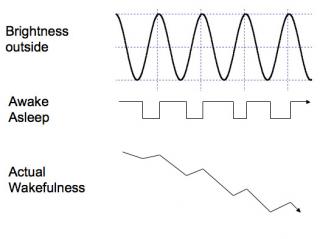The light this afternoon and evening was just gorgeous: beginning as the kind of sharp afternoon that contrasts so markedly with the gray days of rain before, then softening with the return of clouds and the approach of sunset. It offered a good chance to head out of Oxford northwards, in the first expedition for the simple purpose of cycling that I can recall having undertaken in many weeks. As the longer, warmer days of spring arrive, I should try to get back into the habit of visiting Woodstock, 13.2km north by northeast of here, through Yarnton. Otherwise, I spent all my time in an area that runs south from our flat to Carfax, sometimes extending eastwards some way along the High Street and Cowley Road: Milan’s Oxford. On this little map, the red line above ‘University of Oxford’ denotes 1km. The blue polygon denotes the zone in which I spend more than 95% of my time.
The most notable thing about this ride was the empty space between towns. During the fading light of the late afternoon, they provided a sense of immensity in one’s surroundings that cannot be attained when there are ugly pinkish-orange streetlights overhead. On the way back, they provided ample demonstration that six volts and 5.2 amps behind a single halogen bulb is hardly sufficient to cut through a rainy English night.
PS. Privately to Maddie and Meaghan: thanks.

